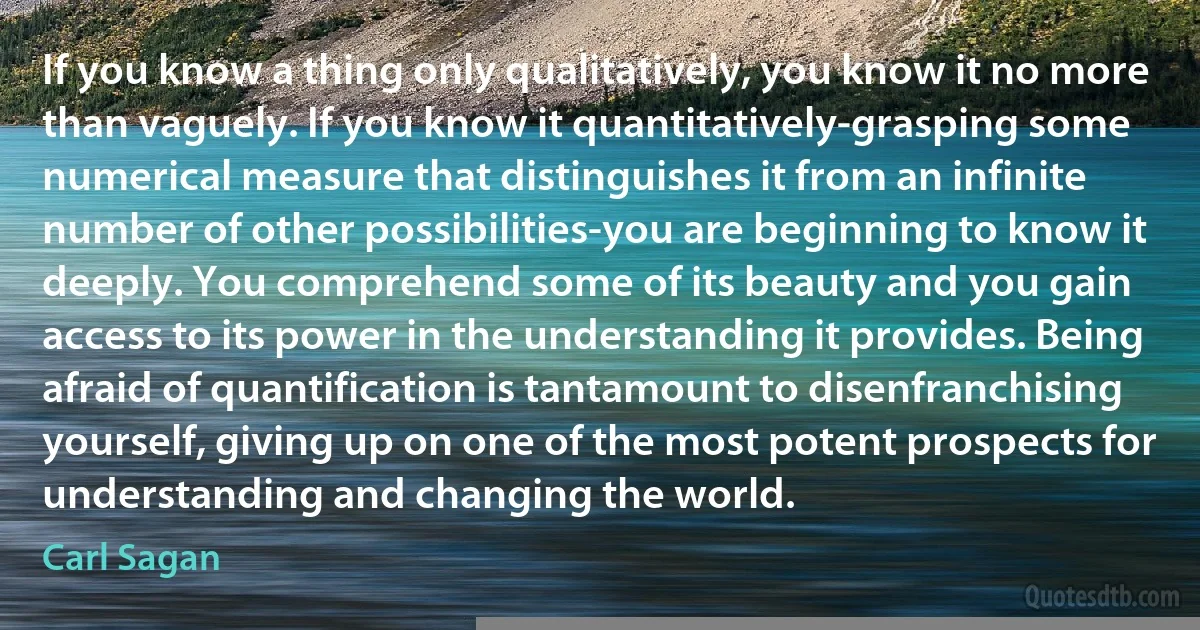Changing Quotes - page 59
Fortune, dost thou threaten poverty? Metrocles laughs at thee, who sleeps during winter among the sheep, in summer in the vestibules of temples, and challenges the king of the Persians, who winters at Babylon, and summers in Media, to vie with him in happiness. Dost thou bring slavery, and bondage, and sale? Diogenes despises thee, who cried out, as he was being sold by some robbers, "Who will buy a master?" Dost thou mix a cup of poison? Didst not thou offer such a one to Socrates? And cheerfully, and mildly, without fear, without changing colour or countenance, he calmly drank it up: and when he was dead, all who survived deemed him happy, as sure to have a divine lot in Hades. And as to thy fire, did not Decius, the general of the Romans, anticipate it for himself, having piled up a funeral pyre between the two armies, and sacrificed himself to Cronos, dedicating himself for the supremacy of his country?

Plutarch
At some point, I stopped and made the following note to myself: I have never finished a story. I'm beginning to see that now. I don't think that there's ever a point where a story or novel is just exactly right. There are only finer and lesser degrees of refinement, and even those are probably subjective. You might think it's perfect for a time, but read it a year or five years later, and you'll see you were mistaken. There's always something I can make better, every time I read one of my stories. Usually there are dozens of somethings. And I once thought this wasn't true, that a story reached a certain point and beyond that point you were only changing things, making them different, not making them better. Indeed, I thought, beyond a point, you risk screwing it all up. I don't think that anymore. You risk screwing it all up right from the start, and no story is ever as perfect as it can be. Perfection is always one or two polishes away from the writer.

Caitlín R. Kiernan
It is precisely through one's learning about the total context in which the language of a subject is expressed that personality may be altered. If one learns how to speak history or mathematics or literary criticism, one becomes, by definition, a different person. The point to be stressed is that a subject is a situation in which and through which people conduct themselves, largely in language. You cannot learn a new form of conduct without changing yourself.

Neil Postman
Everything the Power of the World does is done in a circle. The sky is round, and I have heard that the earth is round like a ball, and so are all the stars. The wind, in its greatest power whirls. Birds make their nest in circles, for theirs is the same religion as ours. The sun comes forth and goes down again in a circle. The moon does the same and both are round. Even the seasons form a great circle in their changing, and always come back again to where they were. The life of a man is a circle from childhood to childhood, and so it is in everything where power moves. Our tepees were round like the nests of birds, and these were always set in a circle, the nation's hoop.

Black Elk
But responsibility for whatever the men in American Government do, is the individual citizen's responsibility. The men who began the Revolution created and bequeathed to every future American the tools for progressively reducing the use of force in human affairs. Every American inherits these unique tools: the Constitution that checks the acts of men in public office, and the convention of delegates which is the peaceful means of changing the Constitution.

Rose Wilder Lane
Republican policies must aim at the most destructive trend in the family disintegration: the undermining of parental authority through parental abdication and government usurpation. Notwithstanding Democratic rhetoric to the contrary, it is not uncompassionate and anti-family to mandate parental consent for all decisions made by minors in and out of school, and to refuse government aid to those who reject the traditional values of responsibility and accountability. While no government program can make people be good, policies should reward people when they are, and not subsidize them when they are not. For example, every level of government should statutorily and procedurally prefer married couples over cohabitators, homosexuals and fornicators. The cost of sin should fall on the sinner not the taxpayer. While such thinking may be attacked for lacking political realism in a changing world, it is imperative that government stand firm in support of traditional family values.

Bob McDonnell
Q: At the time of death when the elements are changing rapidly and there is confusion and fear, what is the method to fix the mind in positivity?
A: It depends on regular practice. It can't be done without prior practice of concentration. At the time of death, people lose control over the mind. Only a few keep awareness of God at that moment.

Baba Hari Dass
I used to have boundaries up all the time, which is limiting. I never want to feel limited. If anything is life changing, being the descendant of a slave is. I went into therapy 10 years ago because I needed to work that out. I've gotten better. Everything about me is more fluid, much less rigid. I'm gonna do everything I can, feel everything I can, until it hurts. Then I'll stop. All they did was buy us–it's not an honor, it's just something that happened. Our gifts belong to us.

Ntozake Shange
One might think, to hear some people talk, that this had been a particularly fine summer. From their point of view, I suppose, it has. They have rushed about the lakes in noisy little boats; they have permitted themselves to be dragged behind other little boats, standing more or less upright on ironing boards; they have immersed themselves in lakes into which countless summer cottage privies drain; they have laboriously pursued summer flirtations, and some of them have achieved gritty conquests on the sands; they have sat in hot little boats waiting to catch fish which they have then had to eat; they have passed many hours changing their skins from pinkish-drab to brown, erroneously believing that they are "storing up sunshine" against the winter months; they have motored penitential distances; they have taken thousands of feet of film of people whose names they will not be able to remember in November. They have amused themselves after their fashion, and I have no quarrel with them.

Robertson Davies
One of my recent analyses contains more than 140 examples of when Tucker Carlson has relied on white nationalists and anti-Semitic tropes in his programming. One of the most prominent ways this manifests is an obsession with racial demographics, and how they are changing in the United States. Tucker Carlson is obsessed with "cultural preservation." There is an entire international far-right movement that echoes such sentiments. Carlson is also constantly fear-mongering about immigrants and blaming every possible problem on the individual choices of immigrants, as opposed to systemic institutions that perpetuate poverty and racism and which impact all people in the United States.

Tucker Carlson
I think I was politicized at age five, once I started noticing the beggars on the streets, and children my age who had to rummage through dumpsters looking for food. But since I grew up in a middle-class milieu where we were always told that "that's just how things are," it never occurred to me that the social order could be changed, much less that I could play a role in changing it. It was only in my teenage years that I understood things about class and inequity and how there was nothing inevitable about it. **On when she became politicized in "AN INTERVIEW WITH THRITY UMRIGAR" in BookSlut.

Thrity Umrigar
I come here today to speak not to posterity but to your generation. In a new and changing world you receive the oldest trust of all. George Washington, in his first Inaugural Address, said: "The destiny of the republican model of government is justly considered... as deeply, as finally staked on the experiment intrusted to the hands of the American people." In the years since he spoke the great experiment has prospered. Where we once stood alone, today the sun never sets on free men, or on men struggling to be free. Even where dictators rule, they often find it necessary to use the language of the rights of man and sometimes find it necessary to modify other dictatorships. For our democracy has proven the most powerful secular idea in the history of man. But the record of success does not mean that we will continue to be successful. The spread of freedom does not guarantee freedom will continue to flourish. The fact we have grown does not mean we will continue to grow.

Lyndon B. Johnson
These are not domestic concerns alone. For upon our achievement of greater vitality and strength here at home hang our fate and future in the world: our ability to sustain and supply the security of free men and nations, our ability to command their respect for our leadership, our ability to expand our trade without threat to our balance of payments, and our ability to adjust to the changing demands of cold war competition and challenge. We shall be judged more by what we do at home than by what we preach abroad. Nothing we could do to help the developing countries would help them half as much as a booming U.S. economy. And nothing our opponents could do to encourage their own ambitions would encourage them half as much as a chronic lagging U.S. economy. These domestic tasks do not divert energy from our security - they provide the very foundation for freedom's survival and success.

John F. Kennedy


